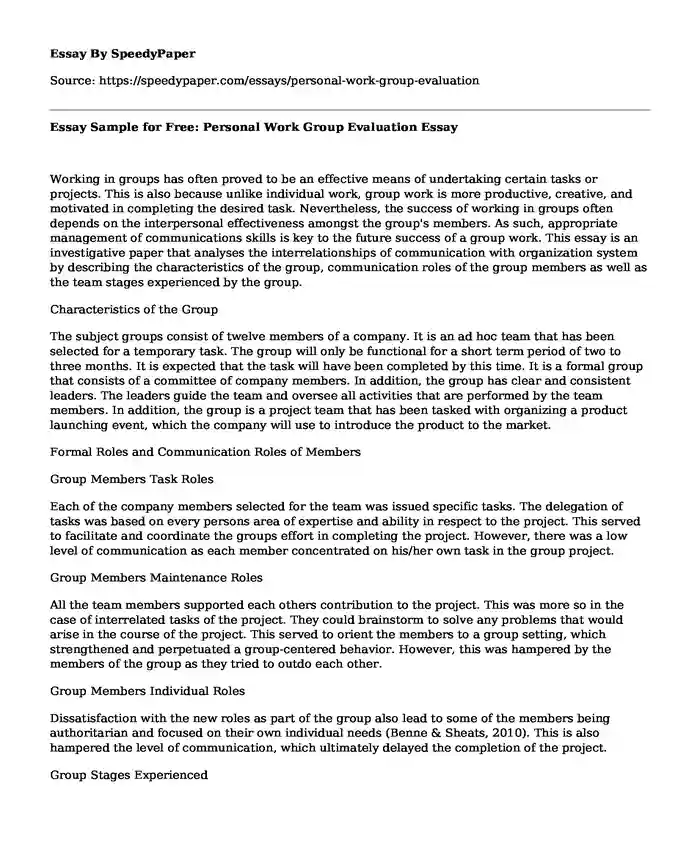
| Type of paper: | Essay |
| Categories: | Management Human resources |
| Pages: | 3 |
| Wordcount: | 697 words |
Working in groups has often proved to be an effective means of undertaking certain tasks or projects. This is also because unlike individual work, group work is more productive, creative, and motivated in completing the desired task. Nevertheless, the success of working in groups often depends on the interpersonal effectiveness amongst the group's members. As such, appropriate management of communications skills is key to the future success of a group work. This essay is an investigative paper that analyses the interrelationships of communication with organization system by describing the characteristics of the group, communication roles of the group members as well as the team stages experienced by the group.
Characteristics of the Group
The subject groups consist of twelve members of a company. It is an ad hoc team that has been selected for a temporary task. The group will only be functional for a short term period of two to three months. It is expected that the task will have been completed by this time. It is a formal group that consists of a committee of company members. In addition, the group has clear and consistent leaders. The leaders guide the team and oversee all activities that are performed by the team members. In addition, the group is a project team that has been tasked with organizing a product launching event, which the company will use to introduce the product to the market.
Formal Roles and Communication Roles of Members
Group Members Task Roles
Each of the company members selected for the team was issued specific tasks. The delegation of tasks was based on every persons area of expertise and ability in respect to the project. This served to facilitate and coordinate the groups effort in completing the project. However, there was a low level of communication as each member concentrated on his/her own task in the group project.
Group Members Maintenance Roles
All the team members supported each others contribution to the project. This was more so in the case of interrelated tasks of the project. They could brainstorm to solve any problems that would arise in the course of the project. This served to orient the members to a group setting, which strengthened and perpetuated a group-centered behavior. However, this was hampered by the members of the group as they tried to outdo each other.
Group Members Individual Roles
Dissatisfaction with the new roles as part of the group also lead to some of the members being authoritarian and focused on their own individual needs (Benne & Sheats, 2010). This is also hampered the level of communication, which ultimately delayed the completion of the project.
Group Stages Experienced
Group Norms
The team leader had set several norms that were classified as the ground rules to be followed by all group members during the course of the project. These were communicated verbally during the first meeting after selection to the group.
Positive and Negative Participation Behavior
Quick and effective completion of tasks by members of the groups can be associated with the positive participation behavior. The group members were also very creative and innovative, especially when solving problems. Nevertheless, there was some negative participation behavior such as members arriving late to team meetings. In addition, the team efforts were troubled with disagreements on certain crucial matters based on individual preferences.
Groups Use of Technology for Communication
The team was able to communicate effectively with one another through the use of emails and texting platforms such as WhatsApp. This enabled efficient coordination of efforts throughout the project period. Despite this, the individual differences also undermined communication between members using such technologies.
Conclusion
In summary, it is evident that the use of groups in undertaking projects is more effective that individual work. Nevertheless, the effectiveness of groups depends on the level of communication and interpersonal skills of the group members. In addition, the two factors are determined by the group members task, maintenance and individual roles. In addition, teams have predetermined norms, which guide the behavior of all members throughout the project.
References
Benne, K. & Sheats, P. (2010). Functional Roles of Group Members. Journal of Social Issues, 4(2), 41-49. http://dx.doi.org/10.1111/j.1540-4560.1948.tb01783.x
Cite this page
Essay Sample for Free: Personal Work Group Evaluation. (2019, Oct 30). Retrieved from https://speedypaper.net/essays/personal-work-group-evaluation
Request Removal
If you are the original author of this essay and no longer wish to have it published on the SpeedyPaper website, please click below to request its removal:
- Essay on the Effects of Technology on Manual Jobs. Research Findings.
- Biology Essay Example: Structure of Eukaryotic Cells
- Ideology, Feminism and Pop Culture - Essay Sample for Your Inspiration
- Presentation Outline Assignment: Health and Wellness of Society
- Essay Example on the American Legal System and the Federal Judiciary
- Essay Sample on a Historical Place You Have Visited
- Free Paper Sample on Gender Roles and Stereotypes
Popular categories




